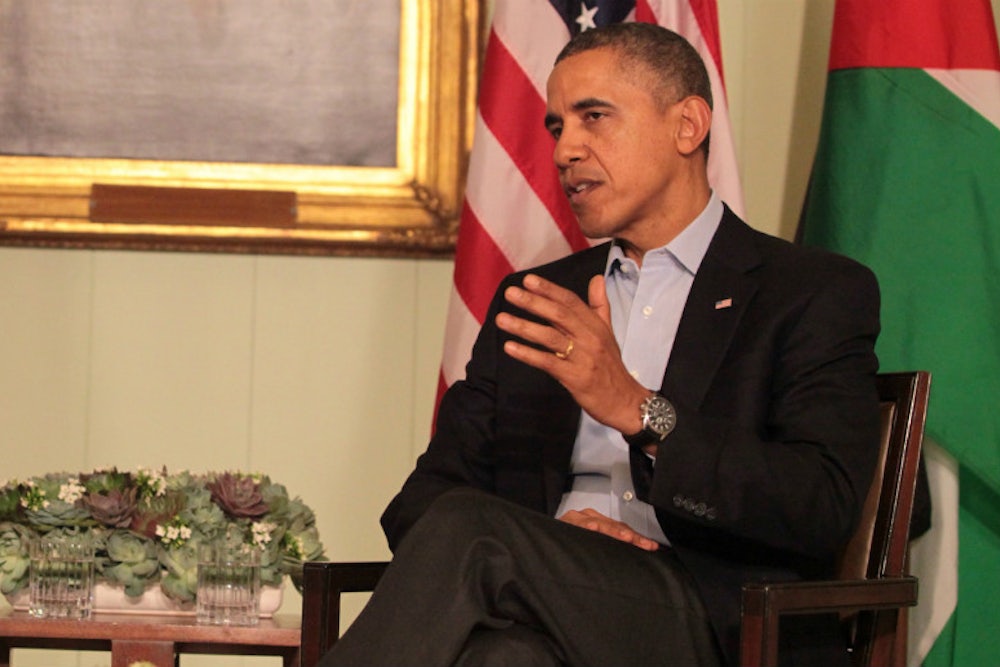According to the State Department, the American-led coalition against the Islamic State currently includes 60 states. While the war against IS is, as President Obama said last week, “an operation that involves the world,” all allies are not equal. Among Washington’s many partners, Jordan is perhaps the most important. From deploying fighter jets to providing logistical support to training moderate Syrian rebels, Jordan is proving an indispensable ally in the campaign against ISIS. And for good reason: IS poses an immediate danger to the Kingdom. In recent months, Jordan has arrested dozens of IS supporters, and just weeks ago Jordan witnessed its second pro-IS demonstration.
But not everyone in Jordan supports membership in the coalition. According to a poll published last month by the Center for Strategic Studies at University of Jordan, only 62 percent of Jordanians consider IS—and a mere 31 percent the Syria-based Al Qaeda affiliate Jabhat Al Nusra—to be terrorist organizations. Even more stunning, just 44 percent of Jordanians surveyed say that Al Qaeda is a terrorist group.
Given these sentiments, it’s not surprising that many Jordanians oppose their military’s participation in the campaign targeting IS and Jabhat Al Nusra.
In fact, objections to a Jordanian role in the anti-IS alliance emerged before the state signed up. In the beginning of September, twenty-one members of Jordan's parliament sent a memo to its speaker rejecting the Kingdom’s participation. “This war is not our war,” the representatives wrote. “Our army is able to defend our borders and respond to any aggression.”
The signatories of the memo represent less than 15 percent of the parliament, but based on Center for Strategic Studies data and on anecdotal evidence gathered during my visits to the Kingdom, anti-coalition sentiment is significantly more prevalent among Jordan’s general population.
Among the opponents of the Kingdom’s involvement, the Islamists have been especially vocal. The local Muslim Brotherhood chapter, for example, not only “rejects the use of Jordanian territory as a military base or launching pad” for coalition forces, it says deployment of troops abroad is a violation of article 127 of the constitution, which confines the role of the military to the “defense” and “safety” of the state.
Jordan’s growing population of Salafis has also been critical. Abu Sayyaf, head of the local Salafi-jihadi movement—which overtly supports Jebhat Al Nusra—described Jordan’s intervention in Syria against IS as “the beginning of the end” of King Abdullah’s regime. Yet another group of 25 Jordanian Islamic scholars published a statement earlier this month in the Jordanian Islamist daily As Sabeel, describing coalition operations as “a campaign against Islam.”
This opposition is not confined to just Islamists. In September, a group called the Popular Jordanian Trend weighed in against the war, accusing the United States of “creating ISIS,” and “using it as a tool to divide the countries of the region and opening the field to its intervention in the internal affairs of its states.”
Secular liberals in Jordan are also criticizing Amman’s robust support of the coalition on pragmatic grounds. In a recent editorial, the online daily JO24.net—known for its moderate views—questioned why King Abdullah would allow Retired General John Allen, who is leading the coalition against IS, to meet Syrian opposition leader Ahmed Al Jarba in Amman. The meeting, the article warned, “opened the door wide for the worst scenarios of [Syrian] retaliatory revenge” against Jordan.
In a democratic country, all this criticism—and the overwhelmingly negative polling numbers—might induce a change of policy. Jordan is not a democracy, but King Abdullah is not impervious to domestic pressures. Revolutions in several Arab states, as well as Jordan’s own severe economic problems—exacerbated by the arrival of nearly a million Syrian refugees—have made King Abdullah more sensitive, if not responsive, to his domestic critics.
But King Abdullah’s considerations extend beyond Jordan’s borders. In addition to the threat posed by IS and its ilk in Iraq and Syria, Washington—the Kingdom’s leading benefactor—has undoubtedly made clear that participation in the coalition is a necessity.
Given the stakes, Jordan is unlikely to reverse course anytime soon. But should air operations persist in the coming years, Jordan’s coalition activities could eventually join the economy and Syrian refugees as a locus of popular frustration and discontent in the Kingdom.
Regardless of how continued coalition participation plays out on the streets of Amman, the Center for Strategic Studies poll suggests that the war in Syria—in which a nominally Shiite regime has slaughtered nearly 200,000 mostly Sunni Muslims—remains an emotionally evocative issue for Jordanians and a font of sympathy for IS and Jabhat Al Nusra. Of course, should these organizations perpetrate attacks in Jordan—like the 2005 Al Qaeda hotel bombings in Amman—local support for these groups could plummet. In the meantime, as the Palace dispatches bombing sorties and mitigates immediate threats posed by IS, the ongoing dynamic in Syria guarantees a growing and potentially destabilizing reservoir of popular support for terrorists in the Kingdom.
